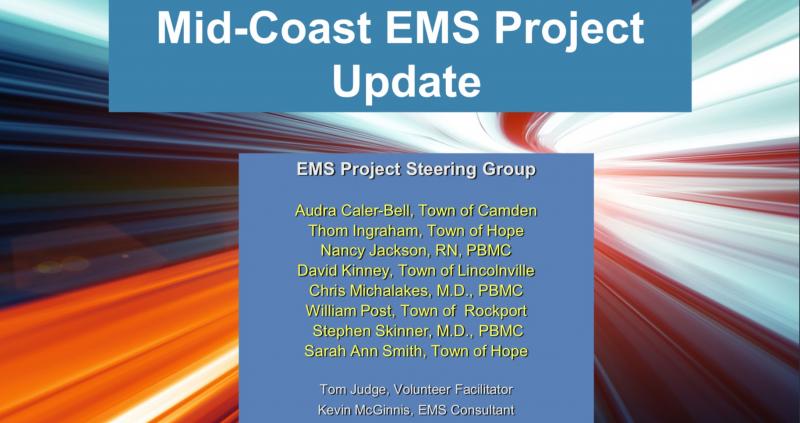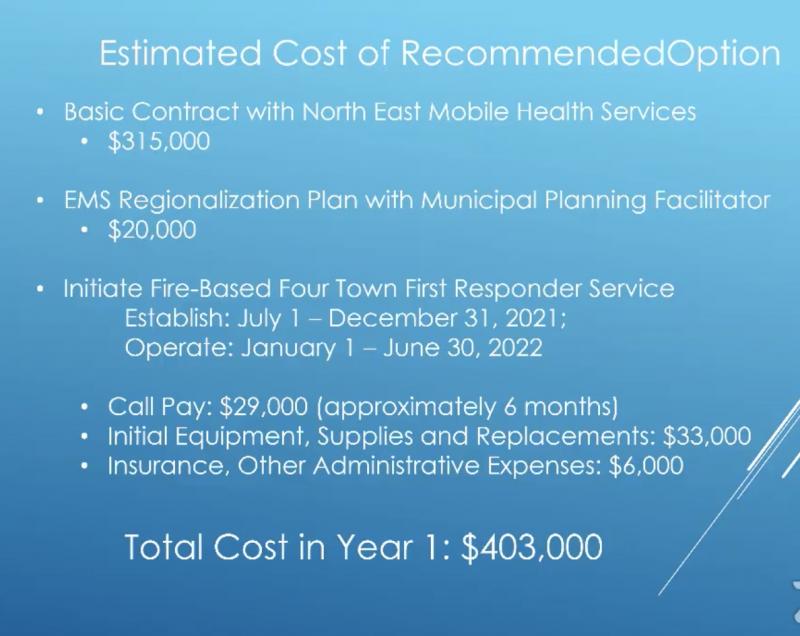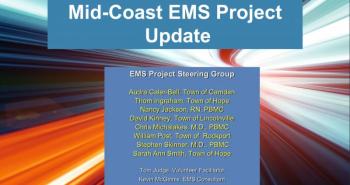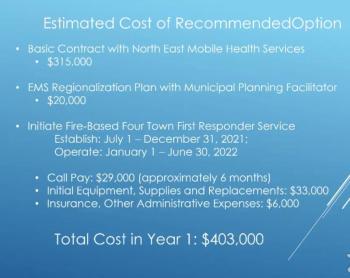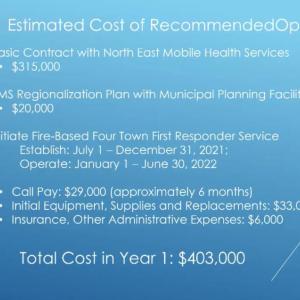Committee recommends slow steps toward EMS regional service; establish corps of first responders
Two years ago, area fire chiefs broached the idea of establishing a regional, and municipally-run, ambulance service. Concerns over efficiencies with the existing privately-owned service had engendered the conversation, which was followed by the creation of a four-town steering committee, representing Camden, Hope, Lincolnville and Rockport, and Pen Bay Medical Center, whose task was to take a hard look at the local EMS system.
This week, both the Lincolnville and Camden Select Boards, with guest attendance by a few Rockport officials, convened via Zoom Feb. 8 and 9 to hear a report and subsequent recommendations on improving the four-town EMS service.
Ten options were reviewed and six ultimately presented, ranging in annual costs from the status quo of $311,000 to $1.4 million. (See attached PDF for the list of options and associated costs).
The one that is currently the most attractive to the steering committee would cost approximately $403,000 and incorporates combining the existing system, while augmenting with a new community-based emergency response.
This would entail renewing the EMS contracts each town has with the Scarborough-based North East Mobile Health Services, and then creating a Four-Town First Responder Service by the end of this year.
The $403,000 option is approximately $90,000 more than the $311,000 that the four towns are currently and collectively paying North East.
“We need to make a decision that is the right choice for the area,” said consultant Kevin McGinnis, who had been hired by the four towns to analyze the current EMS service with North East Mobile Health Services (NEMHS).
He noted that while one option included creating a new municipally-funded and staffed EMS service, the complications of starting such a venture during the COVID-19 pandemic, plus the short window of opportunity before the existing North East contracts run out in July posed impractical solutions.
Those two factors, he said, makes that option, “unreasonable and probably irresponsible.”
The hybrid system — a mixed NEMHS and fire-based response, as presented and endorsed by some select board members, would commit the towns to renewing their individual contracts with North East.
In addition, the goal would be to build a corps of EMT-trained first responders, many already volunteers with the area fire departments, to help at the scenes of serious medical emergencies — crashes and fires.
This approach, the steering committee suggested, will allow time for the communities to further study the option of building their own regional community-owned EMS service.
It is a proposal that each of the towns will consider as they move into their respective 2022 budget building season, potentially adding first responder money to public safety fiscal lines.
“All four fire department chiefs concur,” said McGinnis.
McGinnis, who spoke to the select boards, has an extensive EMS background, including time spent in Rockport with North East when it first took over in 2013 as the area’s ambulance service from the local nonprofit Camden First Aid.
He had been hired in 2019 by the towns to analyze the existing North East Mobile Health Services contracts, as well as complaints, standard operating procedures, staffing schedules, mutual aid agreements, local leadership structure, strategic planning documents and process, quality improvement studies, and performance reports.
Helping him were Tom Judge, director of LifeFlight of Maine, and Mike Senecal, paramedic chief in Farmington.
The Steering Committee included town managers/administrators Audra Caler, of Camden, David Kinney, of Lincolnville, and William Post, of Rockport; Hope select board members Sarah Ann Smith and Thom Ingraham; Nancy Jackson, R.N., at Pen Bay Medical Center, and Doctors Chris Michalakes and Stephen Skinner, also at Pen Bay.
The analysis included 40 interviews with stakeholders, including select board members, town staff, Pen Bay Medical Center employees and Maine EMS.
The Steering Committee acted as project oversight, and eventually produced the report and recommendations.
The report was frank in its assessment of concerns raised about NEMHS, including timeliness of response to emergencies, the over-use of Rockland EMS for mutual aid assistance, the quality of patient interaction skills, and supervisory capacity at the Rockport North East station.
“All contributed to why we are talking about it here today,” said McGinnis, at the Lincolnville Feb. 8 meeting.
McGinnis also provided both select boards with a crash course in Maine EMS structure. As of January 2021, Maine has85 emergency medical responders — EMRs; 2,631 emergency medical technicians — EMTs; 878 advanced emergency technicians — AEMTs; and 1,469 paramedics.
The state has, according to McGinnis:
• 173 fire service first responder or ambulance services, such as what the City of Rockland has;
• 41 nonprofit community EMS services, such as St. George;
• 35 independent municipal EMS services;
• 11 private EMS services, including North East;
•. 11 hospital-based EMS services;
• three college based EMS services;
• two tribal EMS services.
While the Steering Committee leans toward the hybrid model, it does not preclude future conversations about an EMS regionalization plan, said McGinnis.
In the findings, the steering group: “recommends initiating a further planning initiative to consider regionalization of EMS. Fire-based regionalization should also be considered in this process. Should invite Thomaston, Warren, Union and others who may be interested.”
The four towns have been contracting with North East since 2013, when voters endorsed at their individual June town meetings to contract with the Scarborough company, following an arduous decision to break ties with the struggling, and now dissolved, local nonprofit, Camden First Aid.
Since 2013, the cost of contracting with North East has increased, mostly dramatically in 2018. Initially, the towns were charged an annual fee of $10,000; Camden’s proposed 2019 budget carries a line item for North East Ambulance Service of $155,000. This year, 2018-2019, Camden is spending $140,000 on the ambulance service.
Reach Editorial Director Lynda Clancy at lyndaclancy@penbaypilot.com; 207-706-6657
Event Date
Address
United States

